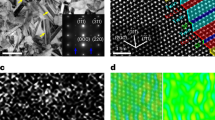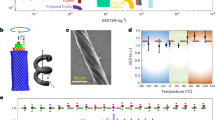Abstract
THE unique properties of pyrolytic carbon have made it useful for many high-temperature applications. Because of the anisotropy of the physical and mechanical properties of the individual crystallites, the properties of macroscopic specimens depend strongly on their preferred orientations. For certain applications, such as thermal shields, high anisotropy may be desirable; on the other hand, other applications (those requiring good thermal shock resistance) would benefit from isotropic properties resulting from a random structure.
This is a preview of subscription content, access via your institution
Access options
Subscribe to this journal
Receive 51 print issues and online access
$199.00 per year
only $3.90 per issue
Buy this article
- Purchase on Springer Link
- Instant access to full article PDF
Prices may be subject to local taxes which are calculated during checkout
Similar content being viewed by others
References
Rappencau, J., et al., presented in Proc. Sixth Biennial Conf. on Carbon (Pittsburgh, 1963).
Bacon, G. E., J. App. Chem., 6, 477 (1956).
Author information
Authors and Affiliations
Rights and permissions
About this article
Cite this article
BOKROS, J. Random Pyrolytic Carbon. Nature 202, 1004–1005 (1964). https://doi.org/10.1038/2021004a0
Issue Date:
DOI: https://doi.org/10.1038/2021004a0
Comments
By submitting a comment you agree to abide by our Terms and Community Guidelines. If you find something abusive or that does not comply with our terms or guidelines please flag it as inappropriate.



